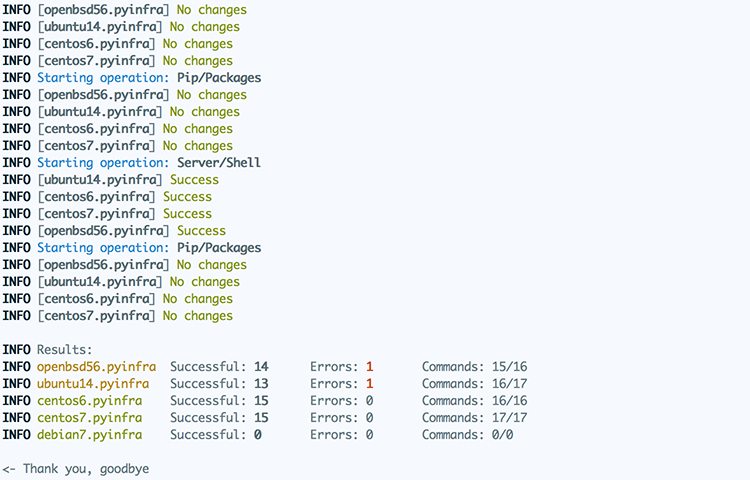pyinfra automates service deployment. It does this by diffing the state of the server with the state defined in the deploy script. Deploys are asyncronous and highly performant. The inventory & deploy are managed with pure Python, allowing for near-infinite extendability.
When you run pyinfra -i INVENTORY DEPLOY, you'll see something like:
A inventory file might look like:
GROUP = [
'my.hostname'
]And a deploy file like:
# These modules contain operations, which provide ways to set desired state
# for the remove service.
from pyinfra.modules import files, server
# Ensure the state of a user
server.user(
'pyinfra',
present=True,
home='/home/pyinfra'
)
# Ensure the state of files
files.file(
'/var/log/pyinfra.log',
user='pyinfra',
group='pyinfra',
permissions='644',
sudo=True
)Alternatively, you can use the Python API:
from pyinfra import state
from pyinfra.api import Inventory, State
from pyinfra.api.operation import add_op
from pyinfra.api.operations import run_ops
from pyinfra.api.ssh import connect_all
from pyinfra.api.facts import get_facts
from pyinfra.modules import files, server
# Setup inventory of target hosts
inventory = Inventory(
([
'my.hostname'
], {}),
ssh_user='user',
ssh_key='/path/to/keyfile'
)
# Setup the pyinfra state for this deploy
state.new(State(inventory))
# Connect to all the hosts
connect_all()
# Now we can build up a list of operations to run (running facts as required)
add_op(
server.user,
'pyinfra',
present=True,
home='/home/pyinfra'
)
# Ensure the state of files
add_op(
files.file,
'/var/log/pyinfra.log',
user='pyinfra',
group='pyinfra',
permissions='644',
sudo=True
)
# And finally we run the ops
run_ops()